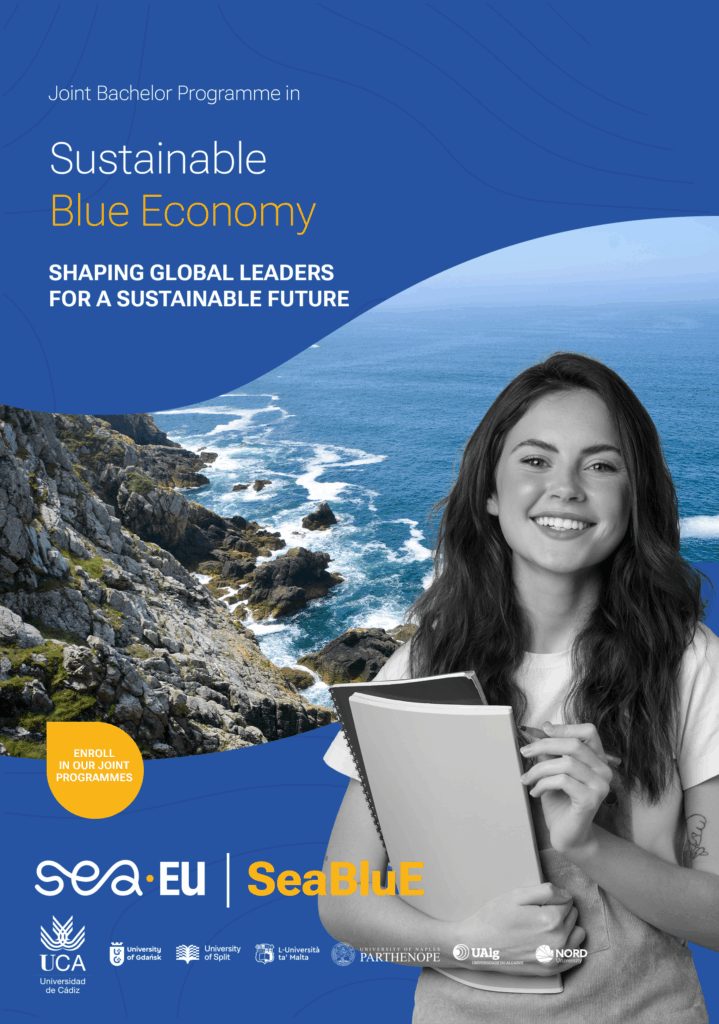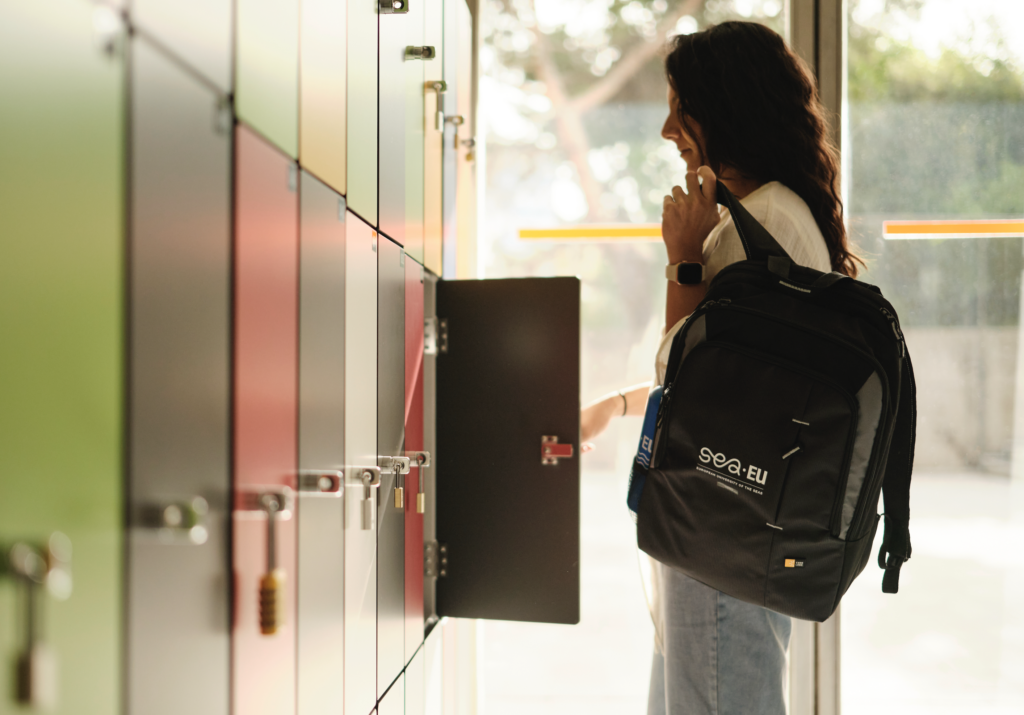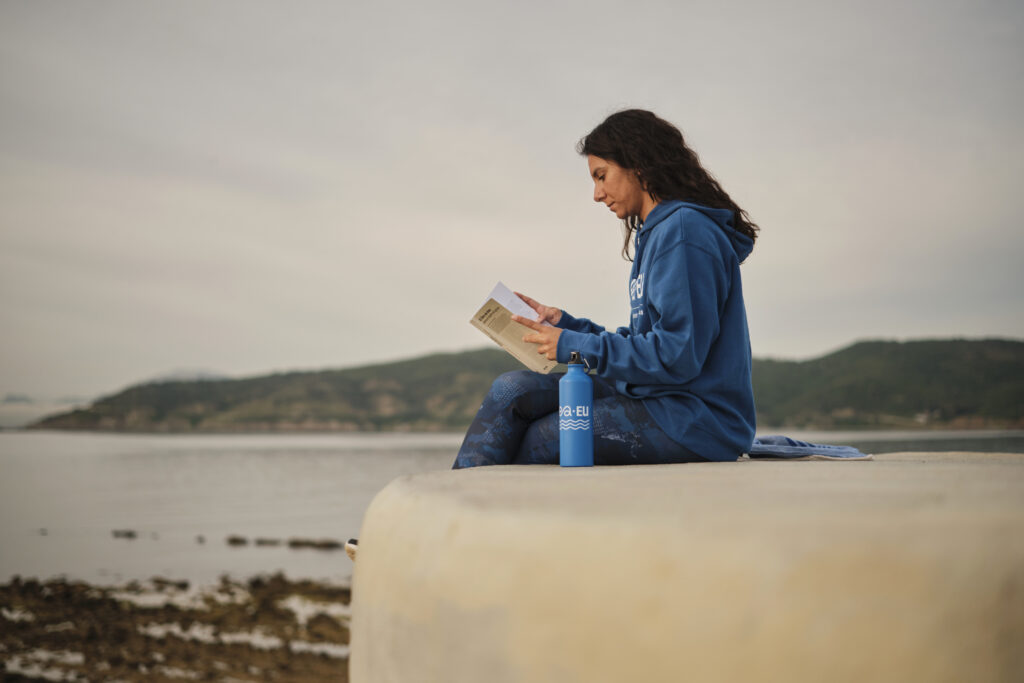SEA-EU Joint Bachelor: SeaBluE
Navigating Marine Innovation for a Sustainable Tomorrow
This programme equips you with the knowledge to address critical challenges like marine pollution, overfishing, and climate change.
Study at multiple coastal universities, develop adaptive and transferable skills, and gain a holistic understanding of marine ecosystems and economic growth.
Become a leader in sectors such as marine conservation, sustainable fisheries, and maritime policy.
Your journey toward a sustainable future begins here.
As a SEA-EU Joint Programme, SeaBluE is part of a transnational educational initiative that integrates the expertise, resources, and infrastructures of 7 SEA-EU universities, providing students with a truly European and interdisciplinary academic experience.
SeaBluE is a three-year programme, fully taught in English, structured as follows:
Y1. Core Module (60 ECTS). Learning the ropes!
Y2. Toolbox Module (60 ECTS). Running a tight ship!
Y3. Expertise Module (60 ECTS). Charting the course!
Choose your pathway from these 6 options (Y3):
1. Blue Sustainability Accounting, Management and Planning (UPN/UG)
2. Conservation and Sustainable Use of Marine Resources (UG)
3. Human Impact in the Arctic (NORD)
4. Sustainable Port-Tourism Cities (UNIST)
5. Blue Management: Accounting, Conservation and Restoration (UCA)
6. Blue Industries: Tourism and Seafood (UAlg/UCA)
Bachelor Project (Y3):
Option 1. Research oriented. Research bachelor project (15 ECTS)
Option 2. Professionally oriented. Internship (10 ECTS) + Bachelor project (5 ECTS)
SeaBluE includes a mandatory mobility period of 12 months, ensuring that students gain experience across different institutions and work environments.
Call for Applications 2026/2027:
Phase 1: Non-EU – 10 February – deadline: 30 April
Phase 2: EU students – opening 1 May – deadline: 20 July
Phase 3: EU students – opening 21 July – deadline: 6 September
Application Procedure
PHASE 1 Non-EU candidates | PHASE 2 EU candidates | PHASE 3 EU candidates | |
Open Call | 10 February – 30 April | 1 May – 20 July | 21 July – 6 September |
Document validation | 1-7 May | Ongoing | Ongoing |
Provisional list of validated applications | 8 May | 22 Jul | 8 Sep |
Appeal to the provisional list of validated applications | 11-13 May | 22-23 Jul | 8-9 Sep |
Final list of validated applications | 14 May | 24 Jul | 10 Sep |
Selection process | 14-21 May | 24-28 Jul | 10-14 Sep |
Provisional list of selected candidates | 22 May | 28 Jul | 15 Sep |
Appeal to the provisional list of selected candidates | 25-26 May | 29 – 30 Jul | 15-16 Sep |
Resolution. Final list of selected candidates | 27 May | 31 Jul | 17 Sep |
Acceptance of the seat by the candidate | 1-12 Jun | 1 Aug – 3 Sep | 17-15 Sep |
Visa procedure | N/A | N/A | |
Enrolment | 1-12 Jun | 1 Aug – 3 Sep | 17 – 25 Sep |
*Please read carefully the instructions below before submitting your application.
Required documents
Please note: All applicants must meet the admission requirements prior to applying. We do not accept applications or documentation after the given deadlines.
Below are the general requirements to access SeaBluE.
- Diploma Requirements. For admission to the programme the following diploma requirements apply:
- A certificate of secondary education or International Baccalaureate awarded by a Member State of the European Union, provided that the student can be admitted in that Member State to a programme equivalent to a Joint Bachelor’s degree.
- A certificate of secondary education and University Entrance Exam Scores awarded by a Member State of the European Union, provided that the student requires in that Member State such an entrance certificate for admission to an equivalent programme to the Joint Bachelor’s degree in Sustainable Blue Economy.
- A degree of higher education awarded within the European Union.
- A degree or certificate awarded within the European Union which, pursuant to a law, decree, European guideline, or another international agreement, is deemed equivalent to the certificates mentioned in the three foregoing categories.
- In addition to this, the programme may admit applicants who have obtained a degree or certificate in:
- A State outside the European Union, or
- A Member State of the European Union if the degree is not deemed equivalent within the meaning of section 5.
Such admission shall only be possible on the condition that such degree or certificate gives access to the bachelor’s programme in the State where it has been awarded, and on the condition that the degree or certificate in question has been authenticated.
- Minimum English level B1, according to the CEFR (Common European Framework of Reference for Languages).
Applicants who hold a prior secondary education degree or higher education degree awarded by an English-speaking programme from Australia, Canada, Ireland, New Zealand, United Kingdom, the USA, among others, shall automatically be exempted from this language requirement.
The following supporting documents will be uploaded into the application system. Please note that all documents need to be uploaded in PDF.
- Recent photograph (Photographs serve an identification purpose. Therefore, ‘selfies,’ casual photos, or any other photos that do not meet the formal requirements of official documents will NOT be accepted).
- Copy of a valid Passport/ID Card document.
- Copy of official degree or certificate of secondary education or equivalent.
- Copy of transcript of degree or secondary education academic records.
- Proof of B1 (CEFR) English level.
- Motivation video To assess the applicant’s motivation, each candidate must upload a video pitch (max. 2 minutes) explaining their interest in the programme and their career goals related to the sustainable blue economy. Videos exceeding two minutes will be penalized in the evaluation process.
(*) In the case of follow-up questions, applicants may be invited for an interview by the Academic Steering Committee after the application deadline.
Legalisation of documents
(*) Important considerations about your qualifications.
Legalisation is not required in the case of students whose documents were issued by countries in the European Union or members of the European Economic Area.
Legalisation of documents issued outside Europe. All other students must observe the following conditions:
- Documents issued in countries signatory to The Hague Convention of 5 October 1961 need only be stamped with the Apostille of The Hague by the relevant authorities in the country of issue.
- Documents issued in all other countries must be duly legalised. Legalisation services are provided by:
- The Ministry of Education of the student’s home country, for degree certificates and academic transcripts, and the relevant Ministry of the home country for birth certificates and certificates of nationality.
- The Ministry of Foreign Affairs of the country in which the documents were issued.
Official Translation of documents issued outside Europe. Diplomas, certificates and transcripts of academic records, and other official records, issued outside Europe should be officially translated into English by a Certified Translator. The translation should include all relevant seals, signatures, and stamps from the original documents. The translator should provide a certification statement attesting to the accuracy of the translation. This statement typically includes the translator’s credentials and contact information, a declaration that the translation is a true and accurate representation of the original document, and the translator’s signature and date.
Notice: Documentation that has not been duly legalised in accordance with the regulations in force in the country of issue will not be considered valid for the purposes of the application process. Furthermore, copies must be submitted in high-quality scanned format; photographs of documents will not be accepted.
Selection criteria
The Academic Steering Committee will oversee the selection process. The committee will review the applicants’ academic records, considering their GPA, and any other academic achievements and honours. This is followed by an assessment of the applicants’ video submissions to evaluate their motivation for the joint degree, their alignment with the programme objectives, and their ability to articulate their aspirations and experiences effectively.
The ranking of the students involves assigning points to the candidate’s merits and weighting them to determine the final score:
- GPA, including university entrance exam scores where mandatory: 80%
- Motivation video: 20%
Starting date
The second edition of SeaBluE will start in September, 2026 for the academic year 2026-2027.
Participation fees
Student participation fees cover all costs associated with participation in the programme. This includes tuition fees, access to library and laboratory facilities, mandatory insurance, enrolment fees at the consortium institutions, administrative and organisational support provided by consortium partners, examination fees, and any other compulsory costs directly related to the student’s involvement in the programme.
Student participation fees do not cover accommodation, travel and travel documents (such as visas or passports) required within the framework of the mobility programme. They also do not cover any costs beyond the standard duration of the degree programme, such as re-examination fees. In the event of failure, delayed graduation, or the need for re-enrolment, any additional costs must be covered by the student using their own funds.
In order to ensure equal treatment of all applicants, a single participation fee has been established for all students, regardless of their nationality or country of origin. This measure aims to guarantee that access to the programme is based solely on academic merit and motivation, in line with the fundamental principles of the European Higher Education Area.
€1,500/year
Funding opportunities
Fee waiver scholarships
To promote the participation of students from diverse economic backgrounds, the Joint Programmes Coordination Office will award merit-based fee waiver scholarships. The scholarships will consist of a full exemption from participation fees for the specified academic period, in accordance with the conditions and criteria established by the programme’s Academic Steering Committee.
External scholarships
Interested candidates must carefully review the scholarship requirements to assess their eligibility, as these are external scholarships not managed by the programme. Applicants are solely responsible for completing all application procedures. In the event that a scholarship is awarded, they must inform the Master’s Technical Office so that the necessary administrative arrangements can be made.
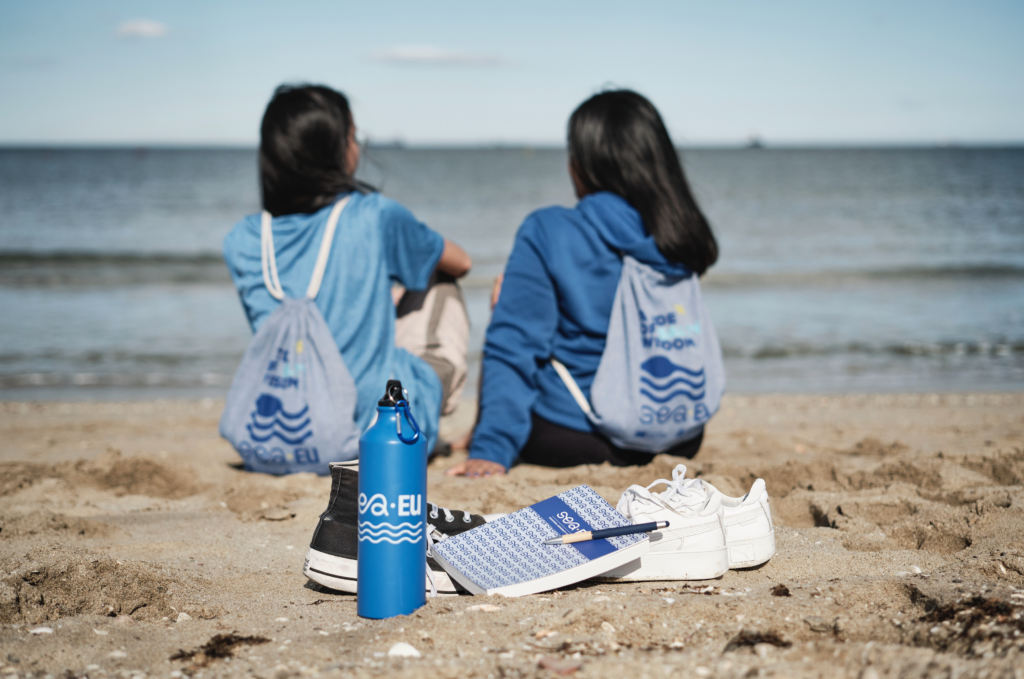
SeaBluE
This document provides an overview of the programme’s main objectives and course structure, as well as the current regulations regarding the academic courses, internships, and the Bachelor’s Project.
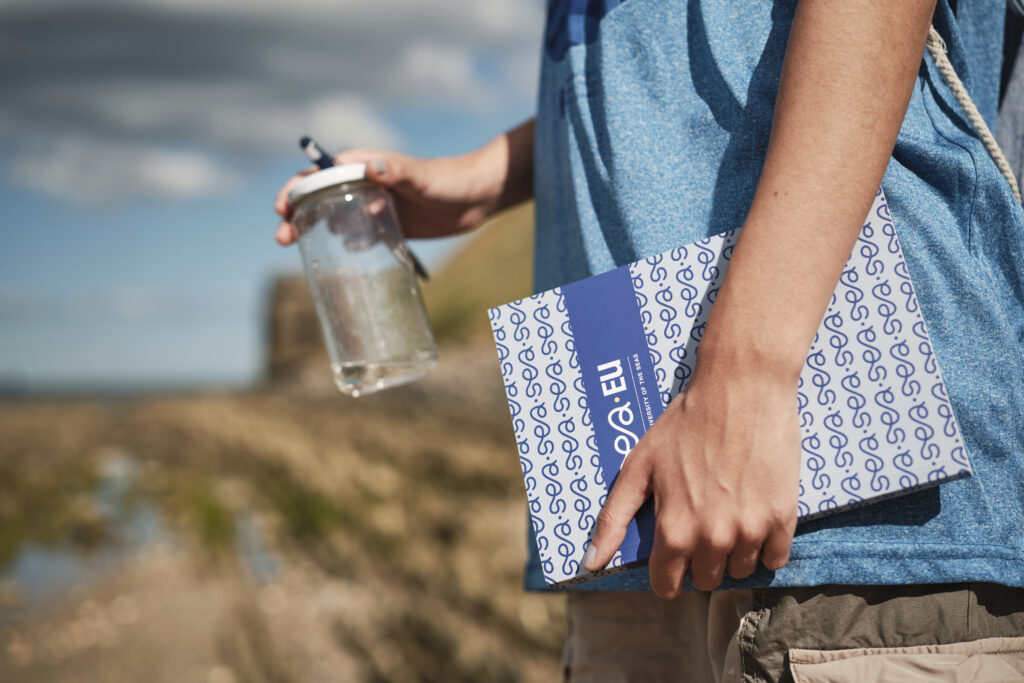
SEA-EU
LEARN MORE ABOUT THE ALLIANCE
SeaBluE is offered by SEA-EU, an Alliance of 9 European Universities shaping the future of Higher Education.
Frequently Asked Questions (FAQ)
About the Programme
What are SEA-EU joint programmes?
Which universities are involved in SeaBluE?
The five Universities that have co-created the master programme are:
University of Cadiz (Spain). Coordinating institution
University of Split (Croatia)
University of Gdansk (Poland)
University of Malta (Malta)
University of Algarve (Portugal)
NORD University (Norway)
Parthenope Naples (Italy)
Is SeaBluE accredited in all SEA-EU countries?
What is the difference between a joint degree and a double degree?
Admissions & Requirements
Academic requirements for enrolment
a) Legalisation is not required in the case of students whose documents were issued by countries in the European Union or members of the European Economic Area.
b) All other students must observe the following conditions:
Documents issued in countries signatory to The Hague Convention of 5 October 1961 need only be stamped with the Apostille of The Hague by the relevant authorities in the country of issue.
Documents issued in all other countries must be duly legalised.
Legalisation services are provided by:
The Ministry of Education of the student’s home country, for degree certificates and transcripts, and the relevant Ministry of the home country for birth certificates and certificates of nationality.
The Ministry of Foreign Affairs of the country in which the documents were issued.
Required Documents
Recent Photograph
(Photographs serve an identification purpose. Therefore, “selfies,” casual photos, or any other photos that do not meet the formal requirements of official documents will NOT be accepted.)Scanned copy of a valid Passport/ID Card document
Scanned copy of Degree or Certificate of Secondary Education
Scanned copy of Transcript of Degree or Certificate of Secondary Education
Scanned copy of B1 (CEFR) English Level Certificate
Motivation Video
(Explaining your interest in the programme and your career goals related to the Sustainable Blue Economy.)
Do I need to take a language test? What level is required?
To be admitted you are required to submit a certificate demonstrating your proficiency in English. The programme mandates a minimum English proficiency of B1 level according to the Common European Framework of Reference for Languages (CEFR), unless English is your native language.
How do I apply, and what are the deadlines?
See the handbook to check application procedure.
Can I apply if I am not currently studying at a SEA-EU university?
Yes, applications are open to students from outside SEA-EU.
Mobility & Programme Structure
Is it mandatory to study at multiple universities?
Yes, SEA-EU joint programmes involve studying at two or more partner universities, ensuring an international and multidisciplinary education.
How are the courses structured in a joint programme?
Courses are co-designed by partner universities, combining in-person, online, and hybrid learning formats.
Are the courses taught in English or other languages?
SEA-EU joint programmes are taught in English.
What kind of support is provided for student mobility?
SEA-EU universities offer guidance on visas, accommodation, and integration into the host university. Scholarships and mobility grants may be available.
Costs & Scholarships
How much does it cost?
SeaBluE costs 1.500€ per year (including: International Health Insurance, Student Card, …)
Are scholarships or financial aid available?
Various funding options are available. Check the handbook to see options.
Do students have to pay tuition fees at all universities they study at?
Students pay tuition fees at the coordinating university only: University of Cadiz.
Degree & Recognition
What degree will I receive upon graduation?
Students will receive a joint diploma issued by all participating universities.
Is my degree recognized in all SEA-EU countries?
Yes, SEA-EU joint degrees are fully accredited and recognized in all partner universities’ countries.
Can I work in any EU country with this degree?
Yes, the degree is recognized across the European Union, enabling graduates to pursue professional careers in different countries.
Career Opportunities
What are the career advantages of studying a joint programme?
SEA-EU joint degrees enhance employability by providing international experience, interdisciplinary knowledge, and a strong European network. Employers value graduates with global perspectives and adaptability.
Some examples are:
Marine Conservationist, Fisheries Manager, Marine Ecotourism Manager, Aquaculture Manager, Oceanographer, Renewable Energy Specialist…
See the handbook for more examples.
Do these programmes include internships or work placements?
Yes. Year 3 includes an option with an international internship.
SBE402-P6. Option 2. Professionally oriented
Internship
+
Bachelor project
More information?
jointprmanager@sea-eu.org
Joint Bachelor in Sustainable Blue Economy
Dive into the future of sustainability with the Joint Bachelor in Sustainable Blue Economy (SeaBluE). This program equips you with the knowledge to address critical challenges like marine pollution, overfishing, and climate change. Study at multiple coastal universities, develop adaptive and transferable skills, and gain a holistic understanding of marine ecosystems and economic growth. Become a leader in sectors such as marine conservation, sustainable fisheries, and maritime policy. Your journey toward a sustainable future begins here.
